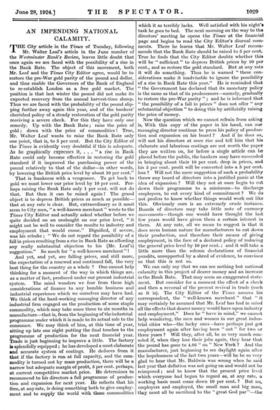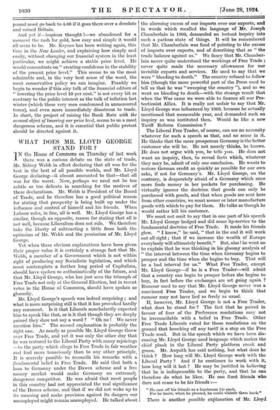AN IMPENDING NATIONAL CALAMITY.
THE City article in the Times of Tuesday, following Mr. Walter Leaf's article in the June number of the Westminster Bank's Review, leaves little doubt that once again we are faced with the possibility of a rise in the Bank Rate. The object of this movement, both Mr. Leaf and the Times City Editor agree, would be to restore the pre-War gold parity of the pound and dollar, and thus enable the Governors of the Bank of England to re-establish London as a free gold market. The position is that last winter the pound did not make its expected recovery from the annual harvest-time slump. Thus we are faced with the probability of the pound slip- ping further away again this year, and of the bankers' cherished policy of a steady restoration of the gold parity receiving a severe check. For this they have only one remedy. Up with the Bank Rate ; raise the price of gold ; down with the price of commodities ! True, Mr. Walter Leaf wants to raise the Bank Rate only one point, that is, to 5 per cent. But the City Editor of the Times is evidently very doubtful if this is adequate. As he graphically expresses it, . . . " a rise in Bank Rate could only become effective in restoring the gold standard if it improved the purchasing power of the pound relatively to that of the dollar—in other words, by lowering the British price level by about 10 per cent."
That is frankness with a vengeance. To get back to gold we must lower our price level by 10 per cent. Per- haps raising the Bank Rate only 1 per cent. will not do that. But then it can be raised again ! The grand object is to depress British prices as much as possible— that at any rate is clear. But, extraordinary as it must seem to City men, " a well-known merchant " wrote to the Times City Editor and actually asked whether before we quite decided on an onslaught on our price level, " it might not be well to consider the results to industry and employment that would ensue." Dignified, if severe, was his rebuke ; " We do not regard the possibility of a fall in prices resulting from a rise in Bank Rate as affording any really substantial objection to his (Mr. Leaf's) suggestion." So much for "a well-known merchant" I And yet, and yet, are falling prices, and still more, the expectation of a renewed and continued fall, the very best thing for the country as a whole ? One cannot help thinking for a moment of the way in which things are, as a matter of fact, produced under our present industrial system. The mind wanders we fear from these high considerations of finance to any humble business and industrial experience which we ourselves may have had. We think of the hard-working managing director of any industrial firm engaged on the production of some staple commodity, which may take some three to six months in manufacture—that is, from the beginning of the industrial programme under which it is made to its actual sale to the consumer. We may think of him, at this time of year, sitting up late one night putting the final touches to the programme of production for the next financial year. Trade is just beginning to improve a little. The factory is splendidly equipped ; he has developed a most elaborate and accurate system of costings. He deduces from it that if the factory is run at full capacity, and the com- modity is turned out by mass production, there will be a narrow but adequate margin of profit, 5 per cent. perhaps, at current competitive market price. He determines to recommend to his directors a full programme of produc- tion and expansion for next year. He reflects that his firm, at any rate, is doing something both to give employ- ment and to supply the world with those commodities which it so terribly lacks. Well satisfied with his night's task he goes to bed. The next morning on the way to the directors' meeting he opens the Times at the financial page and begins to read the City Editor's diurnal com- ments. There he learns that Mr. Walter Leaf recom- mends that the Bank Rate should be raised to 5 per cent. True he finds that the City Editor doubts whether this will be " sufficient " to depress British prices by 10 per cent., and so restore the gold standard. But at any rate it will do something. Thus he is warned " these con- siderations make it inadvisable to ignore the possibility of a rise in Bank Rate this year." He is reminded that " the Government has declared that its monetary policy is the same as that of its predecessors—namely, gradually to restore the pre-War parity " ; and he is informed that " the possibility of a fall in prices " does not offer " any substantial objection " to doing this by artificially raising the price of money.
Now the question which we cannot refrain from asking is, With this copy of the paper in his hand, can our managing director continue to press his policy of produc- tion and expansion on his board And if he does so, will not his directors at once rise and tell him that his elaborate and laborious costings are not worth the paper they are written on, for before a single article can be placed before the public, the bankers may have succeeded in bringing about their 10 per cent. drop in prices, and his 5 per cent. profit will be converted into a 5 per cent.
loss Will not the mere suggestion of such a probability throw any board of directors into a justified panic at the idea of expansion ? Will they not at once begin to cut down their programme to a minimum—to discharge employees, to cut every kind of commitment ? We do not profess to know whether things would work out like this. Obviously ours is an extremely crude instance. Boards of directors may take little note of currency movements—though one would have thought the last few years would have given them a certain interest in them. At any rate, all we mean to suggest is that it does seem human nature for manufacturers to cut down their production, and therefore their means of giving employment, in the face of a declared policy of reducing the general price level by 10 per cent. ; and it will take a little more than the solemn declarations of financial pundits, unsupported by a shred of evidence, to convince us that this is not so.
We can only say that we can see nothing but national calamity in this project of dearer money and an increase in the Bank Rate. That may seem an exaggerated state- ment. But consider for a moment the effect of a check and then a reversal of the present revival in trade (such as it is). The City Editor of the Times assures his correspondent, the " well-known merchant " that " it may certainly be assumed that Mr. Leaf has had in mind all the effects that dearer money would have upon industry and employment." Does he " have in mind," we cannot help wondering, the men and women in our great indus- trial cities who—the lucky ones—have perhaps just got employment again after having been " out " for two or three years ? Will they, after all, be so very much con- soled if, when they lose their jobs again, they hear that the pound has gone to 4.86 " on " New York ? And the manufacturer, just beginning to see daylight again after the hopelessness of the last two years—will he be so very glad to hear that Mr. Baldwin was wrong when he said last year that deflation was not going on and would not be reimposed ; and to know that the present price level which everyone had begun to regard as, at any rate, a working basis must come down 10 per cent. ? But no, employers and employed, the small man and big man, they must all be sacrificed to the " great God par "—the pound must go back to 4.86 if it goes there over a desolate and ruined Britain.
And yet if—impious thought !—we abandoned for a moment the rush for gold, how easy and simple it would all seem to be. Mr. Keynes has been writing again, this time in the New Leader, and explaining how simply and easily, without changing our financial system in the least particular, we might achieve a stable price level. He would concentrate on " creating confidence in the stability of the present price level." This seems to us the most admirable and, in the very best sense of the word, the most conservative policy we can imagine. Frankly we begin to wonder if this airy talk of the financial editors of " lowering the price level 10 per cent." is not every bit as contrary to the public interest as the talk of inflation last winter (which these very men condemned in unmeasured tones), and even more immediately disastrous to trade. In short, the project of raising the Bank Rate with the avowed object of lowering our price level, seems to us a most dangerous scheme, and it is essential that public protest should be directed against it.















































 Previous page
Previous page